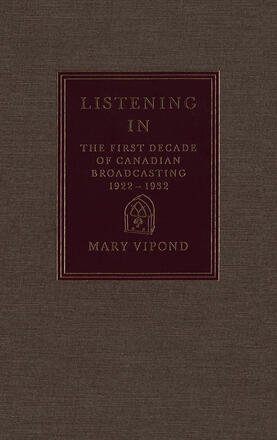
Listening In
The First Decade of Canadian Broadcasting, 1922-1932
Description
Mary Vipond's approach is based on the idea that the development of radio broadcasting was a process that involved equipment manufacturers, broadcasters, and "audiences/customers." She charts the expansion of these three groups, surveys the development of advertising and networking as methods of financing, and analyses the evolution of programming. From 1922 to 1932, radio administration was the responsibility of the Radio Branch of the federal Department of Marine and Fisheries. Vipond discusses the regulatory policies of the branch. She completes her study with an analysis of the period from the formation of the Aird Royal Commission on Radio Broadcasting in 1928 to the passage of the Radio Broadcasting Act of 1932. Between 1922 and 1932, virtually all Canadian broadcasting was in the private sector. The campaign in the early 1930s to institute a broadcasting system oriented more toward public service and the promotion of a national identity was partially successful. Vipond reveals, however, that the act that in 1932 set up the Canadian Radio Broadcasting Commission, now the CBC, was much weaker than has generally been recognized. She argues that this weakness was a consequence of the fact that, over the course of the 1920s, broadcasters, listeners, and politicians alike had built up certain expectations of radio which could not easily be disregarded.
Reviews
"Vipond's use of theoretical and reflective writing about broadcasting, communication, and culture is especially striking ... This is a thorough and judicious history of radio's inaugural era." Kenneth C. Dewar, Department of History, Mount Saint Vincent University. "A marvellous book ... that makes an outstanding contribution to the field ... It will no doubt be required reading for every graduate level course on broadcasting." Rowland Lorimer, Department of Communications, Simon Fraser University.